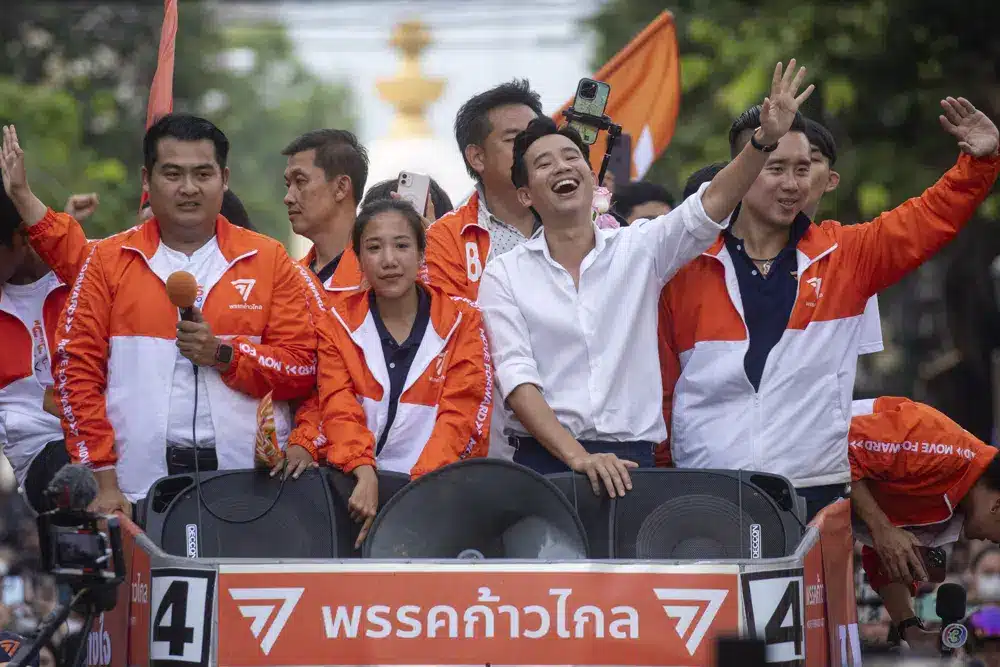BANGKOK, Thailand — Thailand’s main two opposition parties began preparations for the next step of their bid to oust the military-dominated government on Monday, following a shock election triumph in which they secured a majority of seats in the House of Representatives.
The Move Forward Party, led by 42-year-old businessman Pita Limjaroenrat, won the election, outperforming most predictions. It narrowly defeated the Pheu Thai party, which was widely expected to win the election.
Despite the star power of Paetongtarn Shinawatra, daughter of Thaksin Shinawatra, the former populist prime leader who was deposed in a 2006 military coup and who is the driving force behind the party, Pheu Thai has faltered.
“The overwhelming electoral victory by Move Forward and Pheu Thai is a decisive sign that voters want a polity where the people, not the military, decide their future,” said Tyrell Haberkorn, a University of Wisconsin Thai studies scholar.
“Voters want a Thailand with free speech, without compulsory military conscription, and where the people’s voices are valued, not something to be silenced or bought,” she stated.
Pita stated on Monday that he has been in discussions with five other parties about building a coalition government. It would have 309 House seats in total, which would be more stable than the previous 292-seat partnership with Pheu Thai as the sole ally. Parliament will choose a new prime minister in July, giving them roughly two months to reach an agreement.
On Monday afternoon, supporters of Move Forward paraded through Bangkok’s streets to celebrate their triumph. Pita smiled broadly and waved as an open truck convoy brought him and other party members gently through the streets of the capital’s historic quarter.
Thailand has been led for the past nine years by former army leader Prayuth Chan-ocha, who took power in a 2014 military coup and was re-elected prime minister following the 2019 election. He ran for reelection on Sunday, but has been chastised for a sluggish economy, a bungled early reaction to the coronavirus pandemic, and stifling democratic changes – a particular irritant among younger people.
“The sentiment of the era has changed, and it’s right,” Pita said on Monday. “And today is a new day, and hopefully it will be full of bright sunshine and hope for the future.”
Earlier, as it became evident that his party would take the lead, he stated that as the country’s 30th prime minister, he is ready to bring about change. “Whether you agree with me or not, I will be your prime minister.” I will serve you whether you voted for me or not.”
Move Forward and Pheu Thai are mainly united in their opposition to the military’s periodic meddling in politics, as seen by more than a dozen coups since Thailand became a constitutional monarchy in 1932, and most recently in 2006 and 2014.
Both parties support some aspects of monarchy reform, which irritates the traditional royalist establishment, which sees the institution as sacred. Move Forward is viewed as radical in the perspective of mainstream Thai politics since it has been more outspoken on the matter.
With nearly all votes counted as of Monday, Move Forward has won over 24% of the popular vote for 400 constituency seats and more than 36% of the votes for the 100 seats allocated under proportional representation.
The Pheu Thailand party was a close second, with a combined seat total of 141 expected.
Prayuth’s United Thai Nation Party is ranked fifth in constituency votes and third in party preferences, with a predicted total of 36 seats.
Despite the fact that the numbers favour Pita becoming the next Prime Minister, he faces a long road ahead.
Candidates are hampered by constitutional provisions created by the military regime to prevent populist political parties from taking root and upending the long-established conservative system.
The prime minister of Thailand is chosen by a combined session of the newly elected House’s 500 members and the military’s 250 senators. The winning candidate must receive at least 376 votes.
The Senate, together with the army and the courts, voted unanimously for Prayuth in 2019, allowing him to overcome Pheu Thai’s first-place finish and form a coalition government.
There is a considerable risk that Pita will be viewed as too radical by some partner parties, forcing them to seek a more moderate candidate.
Paetongtarn, Pheu Thai’s party base, is the most favoured pick. However, her ties to her father, Thaksin, with whom the military has never reconciled since deposing him in 2006, would make gaining Senate support impossible. In that situation, real estate magnate Srettha Thavisin, another Pheu Thai candidate for prime minister, would have a stronger chance.
There are also concerns that conservative groups in Thai politics would once again use dirty techniques to maintain power. Since Thaksin’s demise, they have regularly exploited the courts and ostensibly independent state bodies like the Election Commission to produce contentious legal judgements that have crippled or sunk political threats from opponents. Such tactics would very certainly spark violent street protests.
“Is Pita’s proposed coalition, with 309 seats, stable enough?” It is the most stable in a democratic world. However, in a world of half-dictatorship in which the Senate is a key component, Move Forward must leverage the Senate with the voices of the people,” said Pinkaew Laungaramsri, an anthropology professor at Chiang Mai University.
“We’ll have to wait and see if the authoritarians will dare to use their illegitimate powers against the will of the people.” If they do that, they’re just encouraging people to return to the streets, (asterisk) she remarked.
SOURCE – (AP)












